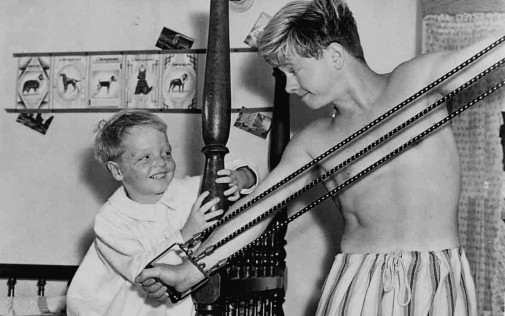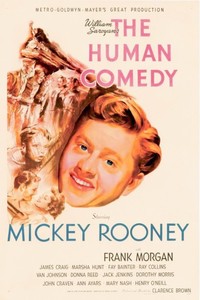While Mickey Rooney's career is famed for its longevity, the actor's professional life wasn't without its hurdles, declines, and subsequent comebacks. Transitioning from childhood stardom to adult celebrity isn't easy for anyone, much less for someone as famous as Rooney. Blessed with a boyish face and short stature, he was perfect for playing young people like the famed Andy Hardy, still acting as a teenager well into his 20s. Boundless energy typified his screen persona, often verging on manic cheer that befitted youthful roles but was out of place in grown-up parts.
In this context, World War II marked a turning point. Before it, Rooney was a performing wunderkind who gave a face and a voice to American teenagers everywhere while earning MGM big bucks at the box office. After it, the young boy shtick lost its appeal, the star quickly fading into a character actor. The Human Comedy, released in 1943, one year before Mickey Rooney was inducted into the US Army, was one of his last big hits. It also netted him a second Best Actor nomination…

Following the model of other sentimental successes like Our Town, The Human Comedy tells several stories from an American small-town during times of hardship, weaving a tapestry of humanity dipped in syrupy feeling. Rooney plays Homer Macauley, a high schooler working part-time as a telegram delivery boy during wartime in the fictitious town of Ithaca, California (based on Fresno where the novel's author was from). Homer's story ties together all the characters of the sprawling cast, the glue solidifying the narrative's disparate parts.
Like many similarly themed pictures during this time, The Human Comedy verges on soppiness, often falling into paroxysms of dewy-eyed sincerity on its path to inspiring moral messages. That said, I'd be lying if I said I was unmoved. It's the kind of movie that's conspicuously working to make its audience cry, but the shamelessness of its intent in no way means the ploy is ineffective. The script's often clunky, and Clarence Brown's direction leaves something to be desired, but the cast is consistently stellar.

Among them, Rooney shines bright. Even while sharing the movie with the likes of Fay Bainter, Frank Morgan, and Van Johnson, the young actor holds his own and smartly embodies The Human Comedy's weepy tonalities without coming off as too forceful. It's not a nuanced performance, often surrendering to each scene's overall emotion with abandon, but one can feel Rooney's ambition for more complex parts coming through. It's an awfully earnest star turn, clever in how it allows the actor to mine his star persona for heart-wrenching sorrow.
Homer's pain feels all the more harrowing because it comes flooding out of the usually peppy and gleeful Mickey Rooney. The actor enters the film singing and exists it with a battered soul, scarred by loss though never lacking in perseverance. Whatever hints of comedic exuberance remain in the performance, they serve as smart contrast to Homer's stoic approach to the job of being an emissary of Death, carrying messages of tragedy to those most hurt by them.

Laurence Olivier once called Mickey Rooney the greatest actor America ever produced. I might disagree with the British thespian's hyperbole, but movies like The Human Comedy make me see why Rooney was so admired. His energy onscreen remains unparalleled and he knew, better than anyone, how to weaponize it. He was a master of playing against type in crucial scenes, using the audience's expectations as part of his craft, finding genuine emotion amidst the bittersweet schmaltz of Old Hollywood's wartime melodrama.
In other words, if you're a fan of the actor, The Human Comedy is essential viewing.

Previously:
Rooney as a franchise star
Rooney as a musical sensation
